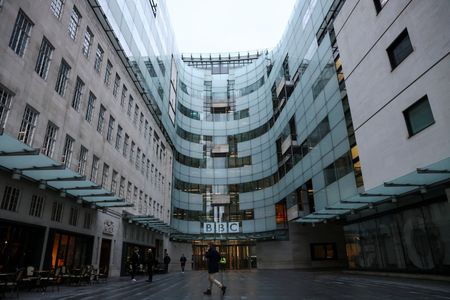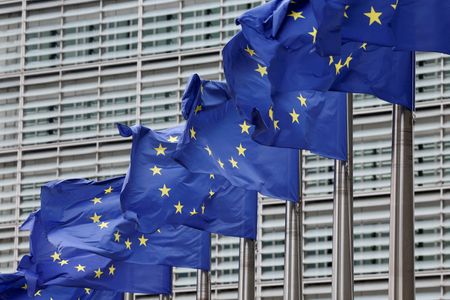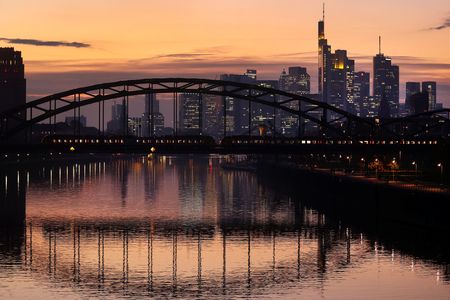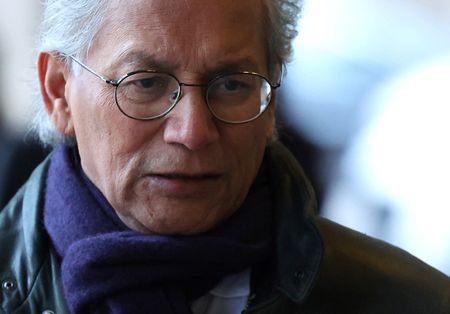By Timour Azhari
DAMASCUS (Reuters) -Syria has foiled two separate Islamic State plots to assassinate President Ahmed al-Sharaa, two senior officials said, adding a personal dimension to the leader’s plans to join a U.S.-led coalition to fight the militant group that he has long battled.
The sources, a senior Syrian security official and a senior Middle Eastern official, said the plots on Sharaa’s life were foiled over the last few months and underlined the direct threat he faces as he tries to consolidate power in a country ruined by 14 years of civil war.
The sources said that, in one case, the IS plot was centered around a pre-announced official engagement involving Sharaa, declining to provide further details due to the sensitivity of the matter.
The Syrian information ministry declined to comment on specific plots, citing security reasons, but said IS continues to pose “a real security threat to Syria and the region” and added that authorities had in the past 10 months foiled a number of IS attacks on various sites, including places of worship.
“Syria affirms its commitment to protecting its people and continuing to fight terrorism in all its forms,” the ministry told Reuters in a statement.
PLOTS EMERGE AHEAD OF SHARAA MEETING WITH TRUMP
The reported plots came to light as Syria is poised to join a U.S.-led global anti-Islamic State coalition when U.S. President Donald Trump hosts Sharaa on Monday for a historic White House meeting, the first ever by a Syrian head of state.
The Syrian president, who came to power last December after the Islamist rebel force he led ousted President Bashar al-Assad, has been keen to promote an image as a moderate leader. He hopes the meeting with Trump will unlock international support for Syria’s long-term rehabilitation and rebuilding.
The move to join the anti-IS coalition exemplifies Syria’s shift since the fall of Assad from being a key ally of Russia and Iran toward closer ties with the Western and Arab camps.
Sharaa’s task in trying to unite Syria remains monumental: his forces have been embroiled in repeated bouts of sectarian violence amid attacks on civilians and security forces that Damascus has blamed on Islamic State.
LONG FIGHT AGAINST ISLAMIC STATE
Over the weekend, the Syrian interior ministry launched a nationwide campaign targeting IS cells across the country, apprehending more than 70 suspects, government media said.
The senior Syrian security official said they were acting on intelligence that the group was planning operations against the government and Syrian minority groups.
It was also intended as a message that Syrian intelligence has deeply penetrated the group and that joining the coalition would bring a major asset to global operations against the militants.
Before taking power in an 11-day lightning offensive last year, Sharaa led Hayat Tahrir al-Sham (HTS), an Islamist rebel group that was formerly Al-Qaeda’s affiliate in Syria.
Sharaa broke those ties in 2016 and has waged bloody battles against Islamic State for more than a decade, carrying out a campaign of arrests and military operations against its cells in HTS’ Idlib stronghold.
Islamic State has tried to stage a comeback in Syria after the fall of Assad. It has sought to portray Sharaa’s rapprochement with the West and pledges to govern for all of Syria’s religious groups as being at odds with Islam.
In June, 25 people were killed in a suicide bombing on a Damascus church, an attack the government blamed on Islamic State. The group did not claim responsibility.
Sharaa’s government has already been coordinating with the U.S. military for months in the fight against Islamic State, according to several Syrian officials, but formally joining is expected to significantly increase cooperation. It is also seen as a key confidence-building measure by Sharaa to convince U.S. lawmakers to lift remaining sanctions against Syria before the end of the year.
Last week, Reuters reported the U.S. military was preparing to establish a presence at a Damascus airbase for the first time. A U.S. administration official asked that the exact location and name of the base not be published, citing operational security concerns.
Syrian state media denied the Reuters report without elaborating on what was false.
(Reporting by Timour Azhari and Mahmoud HassanoEditing by Frances Kerry)











